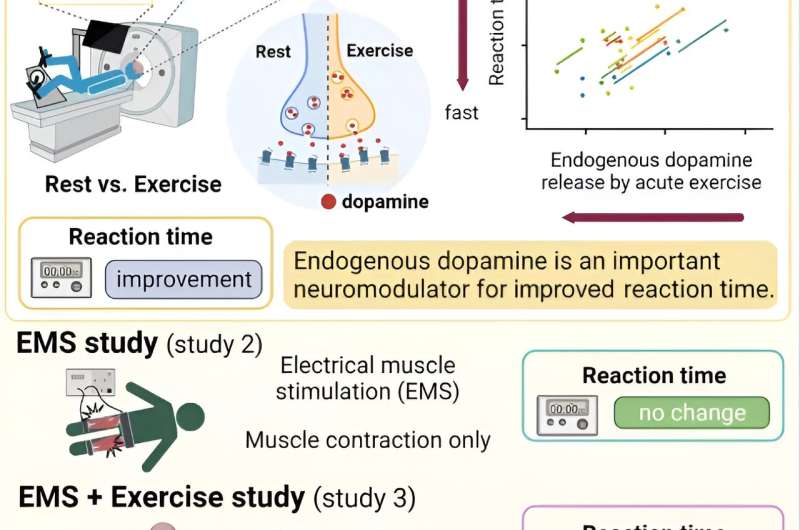This article has been reviewed according to Science X's editorial process and policies. Editors have highlighted the following attributes while ensuring the content's credibility:
fact-checked
peer-reviewed publication
trusted source
proofread
Dopamine could explain why exercise helps boost your brain

A study exploring the mechanisms behind why cognitive performance improves in response to exercise, has found that dopamine plays a key role.
The neurotransmitter and hormone—which is tied to pleasure, satisfaction and motivation—is known to increase when you work out. New findings suggest it is also linked to faster reaction time during exercise.
The researchers behind the discovery say it could lead to a new therapeutic pathway for cognitive health, because of dopamine's significant role in several conditions including Parkinson's disease, schizophrenia, ADHD, addiction, and depression. Their paper is published in The Journal of Physiology
They measured the release of dopamine in the brain using a sophisticated scanning device, known as a positron emission tomography (PET). It tracks the metabolic and biochemical activity of the cells in the body.
The results revealed that when a participant cycled lying down in the machine, their brain increased the amount of dopamine release, and that this process was linked with improved reaction time.
Dr. Joe Costello, from the University's School of Sport, Health & Exercise Science (SHES), said, "We know cardiovascular exercise improves cognitive performance, but the exact mechanisms behind this process have not been rigorously investigated in humans until now.
"Using novel brain imaging techniques, we were able to examine the role dopamine plays in boosting brain function during exercise, and the results are really promising. Our current study suggests the hormone is an important neuromodulator for improved reaction time.
"These findings support growing evidence that exercise prescription is a viable therapy for a host of health conditions across the lifespan."
As part of the study, three experiments were carried out with 52 male participants overall. In the first, individuals were asked to carry out cognitive tasks at rest and while cycling in the PET scanner, so the team could monitor the movement of dopamine in their brain.
The second used electrical muscle stimulation to test whether forced muscle movement to stimulate exercise would also improve cognitive performance. The final experiment combined both voluntary and involuntary exercise.
In the experiments where voluntary exercise was carried out, cognitive performance improved. This was not the case when only forced electrical stimulation was used.
Soichi Ando, Associate Professor in the Health & Sports Science Laboratory at the University of Electro-Communications in Japan, said, "We wanted to remove voluntary muscle movement for part of the study, to see if the process in which acute exercise improves cognitive performance is present during manufactured exercise. But our results indicate that the exercise has to be from the central signals of the brain, and not just the muscle itself.
"This suggests that when we tell our central command to move our body during a workout, that's the process which helps the dopamine release in the brain."
The team's previous study examined the relationship between oxygen levels, cognitive performance and exercise, to test the theory that the more oxygen we breathe during a workout, the more awake our brain is. They found no change to an individual's reaction time when cycling both inside and outside of an environment with low levels of oxygen (hypoxia).
"These latest findings support our previous theory that cognitive performance during exercise is affected by changes to brain regulating hormones, including dopamine," added Dr. Costello.
"There could also be a number of other psychophysiological factors including cerebral blood flow, arousal and motivation that play a part."
The researchers say further studies are urgently needed to fully understand how dopamine release is linked to cognitive performance following exercise.
The authors also recognize limitations to the sample size being relatively small, and recommend more participants are needed in future experiments, from a range of populations including women and older individuals, over a longer period of time.
More information: Soichi Ando et al, The neuromodulatory role of dopamine in improved reaction time by acute cardiovascular exercise, The Journal of Physiology (2024). DOI: 10.1113/JP285173


















